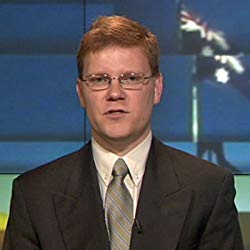Dr. Stephan Fruhling_.jpg

Australia has a complex relationship to nuclear issues. They are a major exporter of uranium for nuclear fuel to global markets, but they have rejected the use of nuclear reactors for the generation of electricity although that policy is currently being debated. There are scattered stores of low-level nuclear wastes at over one hundred sites that should be consolidated. Australia has never had an arsenal of nuclear weapons and has enjoyed the U.S. “nuclear umbrella” for defense against foes armed with nuclear weapons. Recently, however, there have been calls for Australia to develop its own nuclear weapons in response to recent U.S. statements to the effect that the U.S. nuclear umbrella may be withdrawn from countries in southeast 6Asia including Australia, Japan and South Korea.
Australia was caught up in the Cold War. They provided uranium to Britain and allowed Britain to test nuclear weapons in the interior of Australia. They build planes that could be used to deliver nuclear warheads. However, after the Vietnam war, Australia ended its involvement in nuclear weapons programs and ratified the Nuclear Non-Proliferation Treaty in the early 1970s.
In the last decades of the Twentieth Century, Australia’s defense policy came to depend on the U.S. nuclear umbrella and a strong conventional military force. The Australia government issued a 2016 White paper that said, “Only the nuclear and conventional military capabilities of the United States can offer effective deterrence against the possibility of nuclear threats against Australia.”
Dr. Stephan Fruhling is the Associated Dean of the College of Asia and the Pacific at the Australian National University. Dr. Fruhling believes that Australia’s continuous coastline gives it the unique opportunity to create a “moat” of tactical, short-range nuclear weapons to repel air and martime attacks. In an interview, he said, "In air and naval battle on the high seas, nukes can now be employed without significant risk of collateral damage, much like conventional war heads. Australia could establish a maritime exclusion zone in wartime, to increase the military risk for any country planning a major attack against the continent.”
If Australia decided to develop its own nuclear arsenal, one major repercussion might be to lose its access to US intelligence, technology, and weapons systems. Dr. Fruhling said, “Before investing in a nuclear program I think we would have to make a genuine attempt at trying to draw closer to the United States and its nuclear arsenal.”
Another major repercussion has to do with the strategic situation in southeast Asia with respect to Indonesia. There are fears that if Australia began working on a nuclear weapons program, Indonesia might follow suit. Dr. Fruhling said, "Indonesia has regional leadership ambitions, and a strong sense of independence and will, in coming years, tower over Australia economically as well as in population terms. Australian acquisition of nuclear weapons would strengthen Indonesia's reasons to reciprocate, for status as well as security." Dr. Fruhling believes that the fact that Australia does not have nuclear weapons is very important in discouraging Indonesia and other regional powers from pursuing their own nuclear weapons programs.
Dr. Fruhling believes that Australia should only consider the development of a nuclear arsenal if there is a direct existential threat to Australia. He said, “I think we would have to genuinely feel under existential threat by a great power from Asia. A serious study would be the key to assessing whether nuclear weapons could really be a solution to our prospective security problems, rather than a distraction from them.”